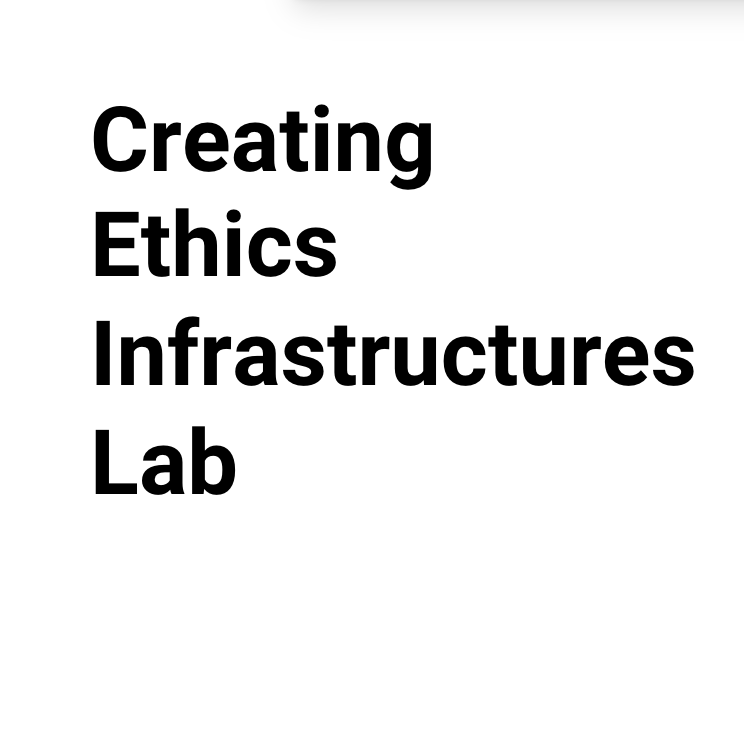Research Areas and Projects

I run the Creating Ethics Infrastructures Lab in the Digital Media Program at the Georgia Tech School of Literature, Media, and Communication.
Technology design is a social and cultural practice (as well as a technical one). Thus, helping technologists design ethical systems requires more than creating technical ethical design tools; it also requires creating social and cultural infrastructures that can help support technologists to make ethical decisions.
These infrastructures may include new organizational practices, law and policy, supporting worker and community-led actions, or developing tools that consider the social and organizational contexts where technologies are developed.
I draw on perspectives from design, science & technology studies (STS), critically-oriented human-computer interaction (HCI), and computer supported cooperative work (CSCW). I use qualitative methods including interviews, participant observation, and discourse analysis. I also use design as a method of inquiry by creating speculative design artifacts, conducting co-design activities, and using design to critically reflect on ethical issues.
Current projects include the following:
Studying Technology Workers’ Ethics Work in Organizational Contexts
This project studies how technology professionals--such as user experience (UX) professionals, product managers, or artificial intelligence (AI) practitioners--attend to values and ethical issues as a part of their professional work. More about this project can be read here. Some research questions here include:
- How do technology practitioners engage in ethics in practice?
- What are the gaps between how ethics work is imagined in rhetoric and tools, and how it is done in practice?
- How is responsibility for ethics distributed within an organization?
- What inequalities arise in who does ethics work?
- What processes of ethical review and accountability exist within technology companies?
- How do practices of peer mentoring construct ideas of what it means to act ethically?
Selected publications:
Seeing Like a Toolkit: How Toolkits Envision the Work of AI Ethics
Richmond Y. Wong, Michael Madaio, Nick Merrill. (2023)
Proceedings of the ACM on Human-Computer Interaction. 7, CSCW1
Honorable Mention Award
Tactics of Soft Resistance in User Experience Professionals’ Values Work
Richmond Y. Wong. (2021)
Proceedings of the ACM Human-Computer Interaction, 5 (CSCW2)
Using Design Fiction Memos to Analyze UX Professionals' Values Work Practices: A Case Study Bridging Ethnographic and Design Futuring Methods
Richmond Y. Wong. (2021)
In Proceedings of the 2021 CHI Conference on Human Factors in Computer Systems (CHI’21)
Addressing Values in Design Beyond the Design Process
This explores how we can exert pressure or enact change toward ethical goals in ways that go beyond directly making changes in technical design? Other social, cultural, legal, and economic practices may be of use. For example:
- How can corporate disclosures about potential digital risks and harms help encourage more ethically-motivated shareholder investment practices?
- How have new standards and risk management frameworks (such as those related to privacy, security, an AI harms) affected the work of technology practitioners?
- What law and policy processes can help reduce the potential for digital harm?
- How can media campaigns, community organizing, or collective action exert pressure on corporate decision making about technology design?
- How do technology workers relate to the local communities surrounding the locations where they work?
Selected publications:
Privacy Legislation as Business Risks: How GDPR and CCPA are Represented in Technology Companies’ Investment Risk Disclosures
Richmond Y. Wong, Andrew Chong, R. Cooper Aspegren. (2023)
Proceedings of the ACM on Human-Computer Interaction. 7, CSCW1
Design Futuring Approaches to Consider Values and Ethics
This project seeks to improve the capacity of design futuring methods to investigate the complexity of ethical issues. Methods such as speculative design or design fiction have the capacity to generate discussion and reflection about ethical issues. How can this be done in productive ways? For instance:
- How can design futuring methods be used in more inclusive and participatory ways?
- How can design futuring practices support technology workers’ ethics work? How can they support law and policy work?
- How can speculative futures better acknowledge and connect to historical practices and historical inequalities?
- How can design futuring let us explore alternate ways to conceptualize and implement values in technology? (What would it mean to design for a different conception of privacy, fairness, or free speech?)
Selected publications:
Timelines: A World-Building Activity for Values Advocacy
Richmond Y. Wong and Tonya Nguyen. (2021)
In Proceedings of the 2021 CHI Conference on Human Factors in Computer Systems (CHI’21)
Using Design Fiction Memos to Analyze UX Professionals' Values Work Practices: A Case Study Bridging Ethnographic and Design Futuring Methods
Richmond Y. Wong. (2021)
In Proceedings of the 2021 CHI Conference on Human Factors in Computer Systems (CHI’21)
Infrastructural Speculations: Tactics for Designing and Interrogating Lifeworlds
Richmond Y. Wong, Vera Khovanskaya, Sarah E. Fox, Nick Merrill and Phoebe Sengers. (2020)
In Proceedings of the 2020 CHI Conference on Human Factors in Computer Systems (CHI’20)
Expanding Modes of Reflection in Design Futuring
Sandjar Kozubaev, Chris Elsden, Noura Howell, Marie Louise Juul Søndergaard, Nick Merrill, Britta Schulte, and Richmond Y. Wong. (2020)
In Proceedings of the 2020 CHI Conference on Human Factors in Computer Systems (CHI’20)
